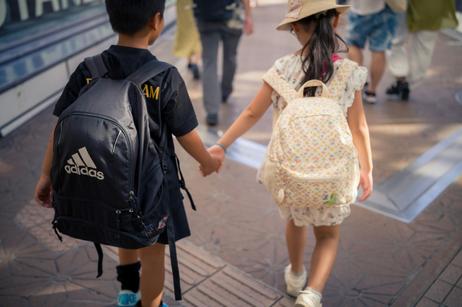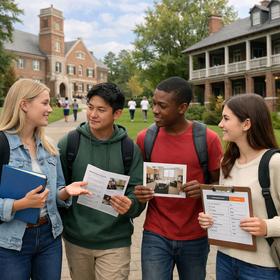In The Pandemic: Parents' Concerns About Boarding School (Updated 2025)
Sending children to boarding school has always involved a mixture of excitement and worry. Parents naturally wonder about safety, homesickness, and tuition. But since the COVID-19 pandemic reshaped education beginning in 2020, boarding schools have had to adapt in ways that continue to influence policy and parental concerns in 2025.
Today, parents’ questions extend beyond virus protocols to include long-term health preparedness, affordability, student well-being, and the value of in-person education in a digital-first world. Let’s address some of the most common concerns families still raise when considering boarding school in 2025.
Will my child be safe at boarding school?
In 2025, safety at boarding schools means more than protection from illness. While the acute phase of the pandemic has passed, schools have kept many of the practices introduced in 2020. Routine health monitoring, improved ventilation, and upgraded campus medical centers are now standard. According to the U.S. Department of Education, over 80% of private schools implemented permanent improvements to air filtration and sanitation systems by 2023, and those investments remain in place (source).
Most boarding schools now employ full-time health directors, some with backgrounds in public health. Regular mental health screenings have become just as common as physical checkups. Parents can expect robust counseling services, expanded wellness programs, and partnerships with local hospitals for rapid response care.
Will my child need health screenings?
While mandatory COVID-19 testing is no longer required, most schools still expect incoming students to provide a recent health certificate and updated vaccination records, including COVID-19 boosters where applicable. Schools may also request health history disclosures to better prepare for chronic conditions or potential outbreaks of flu and RSV, both of which still cause disruptions on campuses nationwide.
Annual flu vaccines are strongly recommended. Some schools even provide on-site vaccination clinics for students and staff. These measures reassure parents that health preparedness remains a priority in 2025.
What happens if my child gets sick at school?
The pandemic permanently reshaped sick policies. No longer are students encouraged to "push through" illness. Instead, schools have set aside isolation housing where students can recover while staying connected academically through hybrid instruction. Parents are usually expected to collect their child within 24 hours if extended medical care is required, but schools have also formalized guardian-at-distance programs to assist international and out-of-state families.
This emphasis on health responsiveness is not just about pandemics—it reflects broader recognition of the importance of protecting entire communities.
Will athletics and extracurriculars still thrive?
In 2020, parents worried that sports and activities would disappear. By contrast, in 2025, boarding schools have doubled down on extracurricular life. The National Federation of State High School Associations reports that 95% of private schools now offer full athletic programs, supported by improved safety protocols (source).
Mask mandates on playing fields are long gone, but better air systems and outdoor training facilities remain. Meanwhile, arts, debate, robotics, and community service programs have expanded, many integrating hybrid participation options for students who are temporarily away from campus.
Extracurriculars continue to be a hallmark of boarding school life—and parents can be confident they are delivered with safety and flexibility in mind.
Will my child receive in-person instruction?
Yes. While remote learning proved invaluable in 2020 and 2021, boarding schools reaffirmed their central mission: in-person, community-based education. Small class sizes—typically 12–15 students—allow for individualized instruction, something parents consistently value. However, schools have retained the option of hybrid instruction for sick or traveling students, ensuring learning is not interrupted.
The emphasis in 2025 is on flexibility: students benefit from the immersive, residential experience while also having access to digital tools that extend learning beyond campus.
What about tuition and affordability?
Tuition continues to be a major concern. In 2025, the average U.S. boarding school tuition ranges from $45,000 to $75,000 per year, depending on location and program offerings (Boarding School Review). Costs remain high, but so does financial aid. Nearly 40% of boarding school students now receive need-based or merit-based aid, and many schools have launched new affordability initiatives in response to post-pandemic financial challenges.
Parents worried about affordability should contact the admissions or financial aid office early. Schools increasingly offer tuition payment plans, emergency relief funds, and endowment-supported scholarships. For families impacted by layoffs or industry instability, flexibility is greater today than it was a decade ago.
How can I support my child’s school?
Schools remain dependent on community support. During the pandemic, families helped cover unexpected expenses such as personal protective equipment and rapid testing. In 2025, donations continue to support financial aid, sustainability projects, and wellness programs.
If you are in a position to give, consider supporting:
Financial aid funds, which directly assist families in need.
Health and wellness programs, ensuring access to counseling and medical resources.
Facility improvements, from dorm renovations to athletic upgrades.
Your contributions strengthen not only your child’s experience but also the school’s ability to remain resilient in uncertain times.
The long-term lessons for families
The pandemic shifted the questions parents ask about boarding schools. Safety and sanitation are no longer assumed—they are carefully evaluated. Affordability is discussed openly, with schools offering more pathways to support families. And wellness, both physical and emotional, has become as central to the boarding school mission as academics.
For many families, boarding school in 2025 represents a safe, enriching, and future-ready choice. As one head of school recently shared in The Wall Street Journal: “Our responsibility is not just to educate students for college, but to care for their whole selves—health, resilience, and community included.”
Final Thoughts
Parents in 2025 weigh familiar concerns—safety, cost, and academics—through a new lens shaped by the pandemic years. Boarding schools have responded with more robust health policies, expanded wellness programs, and stronger financial aid. For families considering this path, the result is an environment that is safer, more supportive, and better prepared than ever before.












